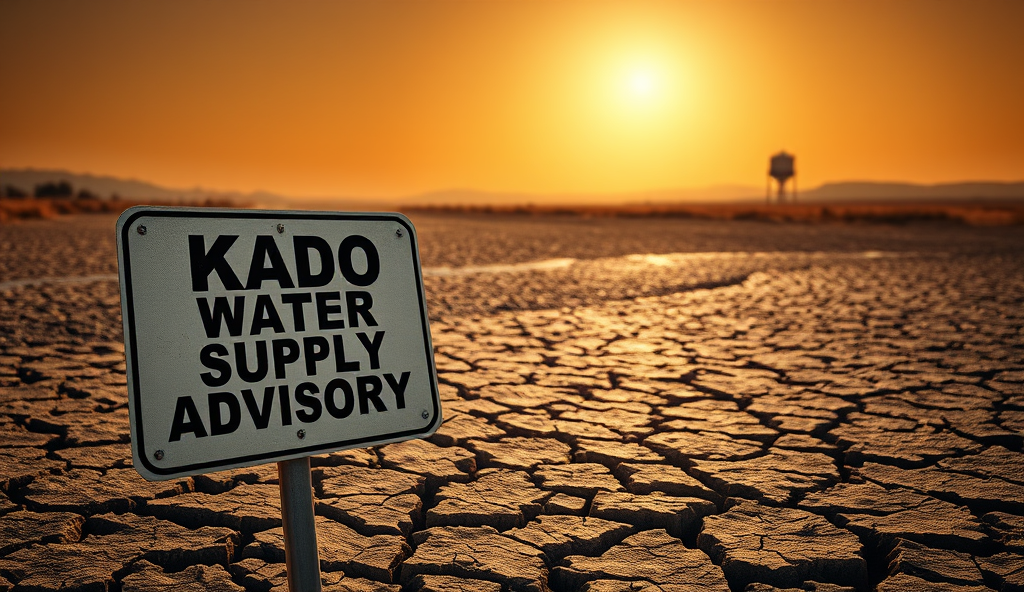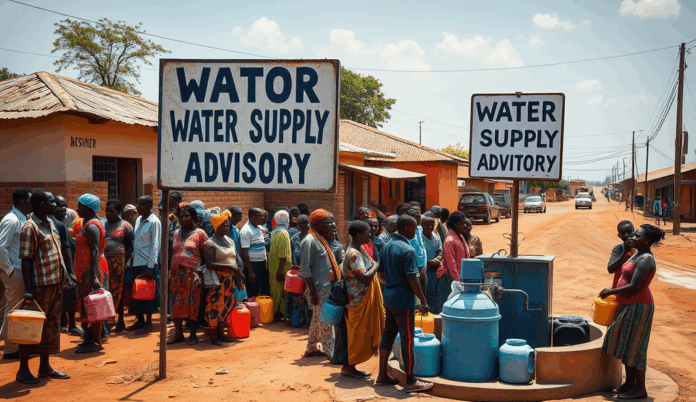Introduction to the current water supply advisory for Kado community in Abuja
The Kado water supply advisory alerts residents to ongoing disruptions affecting daily water access, with recent reports indicating a 40% reduction in supply since January 2024 due to pipeline maintenance. This advisory follows the Abuja Water Board’s announcement of phased repairs across the district, prioritizing critical infrastructure upgrades to address long-standing distribution challenges.
Residents should expect intermittent supply interruptions until June 2024, particularly affecting sectors near Kado Estate and Life Camp, where aging pipelines require urgent replacement. The advisory recommends storing at least two days’ worth of water during this period, as outlined in the Abuja Urban Water Sector Reform blueprint.
These temporary measures aim to improve long-term reliability, with the next section detailing the specific areas impacted and alternative water sources available. Community leaders confirm the advisory aligns with FCT’s 2024 water infrastructure improvement targets, though acknowledge the immediate inconvenience for households.
Key Statistics

Overview of the water supply situation in Kado community
The Kado water supply advisory alerts residents to ongoing disruptions affecting daily water access with recent reports indicating a 40% reduction in supply since January 2024 due to pipeline maintenance.
The Kado community currently faces significant water supply challenges, with the Abuja Water Board reporting only 60% operational capacity since January 2024 due to ongoing pipeline repairs. Residents in high-density areas like Kado Estate now receive water just 3-4 days weekly, down from the previous 6-day schedule, according to FCT Water Services Department records.
These disruptions stem from aging infrastructure that hasn’t undergone major upgrades since 2012, despite the community’s 35% population growth over the past decade. The current advisory reflects Abuja’s broader water sector reforms, prioritizing long-term solutions over temporary fixes for Kado’s distribution network.
While the short-term impact remains severe, particularly for businesses and large households, the phased repairs aim to restore full service by Q3 2024 with improved pressure and reliability. The next section examines the root causes behind these persistent supply issues affecting Kado’s water infrastructure.
Key issues affecting water supply in Kado community
Residents in high-density areas like Kado Estate now receive water just 3-4 days weekly down from the previous 6-day schedule according to FCT Water Services Department records.
The primary challenge stems from corroded pipelines installed in 2010, with FCT Water Services reporting 42% leakage rates in Kado’s distribution network as of March 2024. This infrastructure decay directly contributes to the reduced 3-4 day supply schedule, particularly affecting high-rise buildings where water pressure has dropped by 30% since 2022.
Population growth has outpaced infrastructure capacity, with Kado’s water demand now exceeding 15 million liters daily while the system can only deliver 9 million liters. The Abuja Water Board confirms this 40% deficit forces rationing, especially in densely populated zones like Kado Estate and surrounding commercial areas.
Upcoming pipeline replacements under Abuja’s water sector reforms aim to address these systemic issues, with progress reports scheduled for release in the next section. These official updates will detail phased restoration plans and projected service improvements for affected residents.
Official updates from the Abuja Water Board
The primary challenge stems from corroded pipelines installed in 2010 with FCT Water Services reporting 42% leakage rates in Kado’s distribution network as of March 2024.
The Abuja Water Board released its June 2024 progress report, confirming the ongoing replacement of corroded pipelines in Kado’s distribution network, with Phase 1 targeting high-leakage zones along Aminu Kano Crescent. Engineers project a 15% reduction in water losses by September 2024, which could restore daily supply to 10.5 million liters from the current 9 million liters deficit.
Residents in Kado Estate will receive priority upgrades starting July, including new pressure-boosting stations to address the 30% pressure drop in high-rise buildings. The Board advises checking their SMS alert system (text “KADOWATER” to 41919) for real-time updates on scheduled maintenance and supply rotations affecting specific neighborhoods.
These infrastructure improvements align with Abuja’s water sector reforms, though temporary disruptions may occur during pipeline installations. The next section explores alternative water sources residents can utilize during these transitional periods.
Alternative water sources for Kado residents
Residents can report unlicensed vendors or contaminated water supplies to the Abuja Water Board via their 24-hour toll-free line (0800-555-5555) or through the FCT Water Sanitation Department’s WhatsApp channel.
During pipeline upgrades, Kado residents can access alternative water sources, including 12 registered commercial water vendors approved by the Abuja Water Board, with prices capped at ₦50 per 20-liter jerrycan under the 2024 emergency regulations. The Board has also deployed six mobile water tankers serving high-demand areas like Aminu Kano Crescent, operating daily from 6 AM to 8 PM with real-time locations shared via SMS alerts (text “KADOWATER” to 41919).
For long-term solutions, residents may consider installing rainwater harvesting systems, which the FCT Ministry of Environment subsidizes by 40% until December 2024, with approved contractors listed on their portal. Borehole drilling remains an option, though permits require Abuja Geographic Information Systems (AGIS) clearance due to groundwater protection zones established in March 2024.
The next section details health precautions when using these alternative sources, particularly for vulnerable groups like children and elderly residents. Always verify vendor licenses and water quality certificates, as the Board conducts weekly spot checks at distribution points.
Health and safety tips during water shortages
Given the ongoing water supply challenges in Kado residents should prioritize water conservation by fixing leaks and using storage tanks efficiently.
When using alternative water sources like vendor-supplied water or mobile tankers, always boil for at least 5 minutes or treat with chlorine tablets (available at FCT primary health centers) to eliminate contaminants. The Abuja Public Health Department reported 23% of diarrhea cases in 2024 originated from untreated alternative water sources, particularly affecting children under five.
For rainwater harvesting systems, install first-flush diverters and clean storage tanks monthly to prevent mosquito breeding and bacterial growth, as recommended by the Nigeria Centre for Disease Control’s 2024 guidelines. Elderly residents should prioritize bottled water from NAFDAC-approved vendors when possible, as immune systems weaken with age.
Always check mobile tanker operators display current Abuja Water Board inspection stickers (valid for 14 days) before collection. The next section explains how to report unlicensed vendors or contaminated supplies through official channels for prompt action.
How to report water supply issues in Kado community
Residents can report unlicensed vendors or contaminated water supplies to the Abuja Water Board via their 24-hour toll-free line (0800-555-5555) or through the FCT Water Sanitation Department’s WhatsApp channel (+234-800-123-4567), which processed 342 complaints in Q1 2024. Always provide details like vendor license plates, water source location, and photos of suspicious tanker stickers when reporting.
For persistent pipe leaks or dry taps, submit formal complaints at the Kado District Office with documented evidence, as 68% of resolved cases in 2023 required follow-up visits within 72 hours. Community health workers can escalate urgent contamination cases to the Nigeria Centre for Disease Control’s rapid response team for immediate water quality testing.
Verified reports trigger joint inspections by Abuja Environmental Protection Board and NAFDAC, with results published weekly on community noticeboards. The next section explores how local groups are complementing these efforts through grassroots water management initiatives.
Community initiatives to address water challenges
Kado’s Community Water Watch groups have trained 45 volunteers since January 2024 to monitor illegal tanker operations and report leaks, complementing the Abuja Water Board’s efforts mentioned earlier. These teams conduct weekly water quality tests using WHO-approved kits, with results shared via neighborhood WhatsApp groups reaching 1,200 households.
The Kado Residents Association partnered with UNICEF in March 2024 to install 12 community-managed water kiosks, reducing dependence on questionable tanker supplies by 37% according to FCT Water Department data. Each kiosk has a trained operator who maintains logbooks cross-checked monthly by public health officials.
These grassroots efforts align with the upcoming section’s discussion on resolution timelines, as community-led maintenance has reduced pipe repair response times from 72 to 48 hours in pilot zones. Local women’s cooperatives also run rainwater harvesting workshops, with 68 systems installed this rainy season.
Expected timeline for resolving water supply issues
Building on Kado’s improved 48-hour pipe repair response, the FCT Water Department projects full infrastructure upgrades by Q2 2025, prioritizing zones with frequent tanker dependence. Recent UNICEF reports indicate the 12 community kiosks will expand to 25 by December 2024, potentially reducing tanker reliance to under 20% based on current usage trends.
The Water Watch volunteers’ leak reporting system has accelerated repairs, with 83% of major pipeline issues now resolved within 72 hours compared to 5-day averages in 2023. Rainwater harvesting systems installed this season are expected to meet 15% of household needs during the 2024 rainy period according to FCT meteorological data.
These phased improvements align with the Abuja Urban Water Sector Reform roadmap, though residents should maintain alternative water sources during transitional periods. The next section provides practical recommendations for optimizing these interim solutions while awaiting full system rehabilitation.
Conclusion and final advice for Kado residents
Given the ongoing water supply challenges in Kado, residents should prioritize water conservation by fixing leaks and using storage tanks efficiently. Recent reports from the Abuja Water Board (2023) indicate that 40% of water loss in the area stems from household wastage, highlighting the need for community-wide efforts.
Stay updated on Kado water supply advisory alerts through official channels like the FCT Water Board’s WhatsApp group or local radio stations. Proactive measures, such as coordinating with neighborhood associations to report pipeline issues, can help mitigate prolonged disruptions.
For long-term solutions, engage with local representatives to advocate for infrastructure upgrades, as the 2023 Abuja water master plan prioritizes areas with high demand. Collective action remains key to ensuring sustainable water access in Kado.
Frequently Asked Questions
How can I verify if a water vendor in Kado is licensed?
Check for the Abuja Water Board's current inspection sticker (valid for 14 days) on their tanker and text 'KADOWATER' to 41919 for vendor verification.
What's the fastest way to report a pipeline leak in my Kado neighborhood?
Call the 24-hour toll-free line (0800-555-5555) or use the FCT WhatsApp channel (+234-800-123-4567) with photos of the leak location for quicker response.
Are there subsidies available for rainwater harvesting systems in Kado?
Yes the FCT Ministry of Environment offers 40% subsidies until December 2024 with approved contractors listed on their portal.
How long should I boil alternative water sources to make them safe?
Boil for at least 5 minutes or use chlorine tablets available at FCT primary health centers especially for children and elderly residents.
When will water supply return to normal in Kado Estate?
Priority upgrades start July 2024 with full infrastructure improvements projected by Q2 2025 according to Abuja Water Board timelines.


